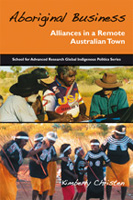Aboriginal Business: Alliances in a remote Aboriginal town
Summary
Christen worked collaboratively with Warumungu people to establish a digital archive of Warumungu history and culture, and contributed to the development of the Nyinkka Nyunyu Art and Culture Centre. Aboriginal Business is based on her doctoral research and work with Warumungu people at Tennant Creek.
‘My work in Tennant Creek started out as somewhat of a fluke — I followed directions. I have continued to return and work with Warumungu people because the drive-through version of Tennant Creek reveals only the surface grit. Those quick denouncements deny the work of the Warumungu community to carve out a place for themselves through sustained alliances generated out of chance meetings and awkward engagements’.
— Kimberly Christen, Preface, Aboriginal Business
Dr Kimberly Christen is Assistant Professor in the Department of Comparative Ethnic Studies, Washington State University, USA. Her primary research involves examining contemporary Indigenous alliances, primarily in Australia, but with comparative analysis globally.
Reviews and endorsement
'Christen’s book is a fine contribution to, and model for, this new path of anthropology: anthropologists can and must research those dusty and seemingly boring frontier towns, because they are sites of some of the most important contact, accommodation, and creativity in contemporary culture. I have to admit that the end of Aboriginal Business left me just a little emotional, which is hard to say about a lot of anthropological writing. I heartily recommend Christen’s book to those who are interested in Australian Aboriginal societies, indigeneity and development, twenty-first-century fieldwork methods, and the possibilities of anthropological literature.'
— Jack David Eller, Anthropology Review Database, 9 March 2010
'Christen presents in Aboriginal Business: Alliances in a Remote Australian Town a focused, complex, and perhaps stubbornly optimistic view of the possibilities that exist when the model of partnership rather than patronage or control frames the relationships between indigenous people and their local, regional, and national communities.'
— Deborah Breen, Indigenous Peoples Issues & Resources, 1 February 2010
